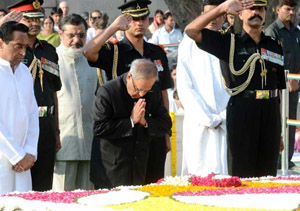New Delhi, Jan 30: Mahatma Gandhi was today fondly remembered on his 67th death anniversary with President Pranab Mukherjee and Prime Minister Narendra Modi leading the country in paying homage to the Father of the Nation.
Mukherjee laid a wreath at Gandhi's memorial at Rajghat. Vice President Mohammad Hamid Ansari and Prime Minister Narendra Modi accompanied by Union Urban Development Minister Venkaiah Naidu also paid floral tributes to the apostle of peace. Congress President Sonia Gandhi and former Prime Minister Manmohan Singh were among the leaders who paid homage to the Mahatma at his memorial.
A two-minute silence in memory of Gandhi was observed.The three service chiefs, Air Chief Marshal Arup Raha, Admiral Robin Dhowan and General Dalbir Singh Suhag, paid tributes followed by Defence Minister Manohar Parrikar and Minister of State for Defence Rao Inderjit Singh. A gun salute was also given on the occasion.
"My tributes to Pujya (respected) Bapu," Modi tweeted.The Father of the Nation was assassinated on this day in 1948 here.
The Prime Minister also paid tributes, on the Martyr's Day today, to all those who have laid down their lives for the country.
"On Martyrs' Day, I pay homage to each & every martyr who laid his or her life for our Nation. Their bravery & courage will always inspire," he added.
A multi-faith prayer service was organised and devotional songs were sung at Rajghat.
Singer-turned-Union Minister Babul Supriyo also paid tribute to the Mahatma by singing a soulful bhajan in Bengali.
A group of singers sang devotional songs, including Mahatma's favourite bhajan, 'Vaishnava Jana To.' Modi attired in a cream kurta and brown Nehru-collared jacket could be seen tapping his toes gently to the tune of the 'bhajans.'
School students and people from different walks of life had also gathered at the Rajghat to pay respect to the Father of the Nation.






Comments
Add new comment